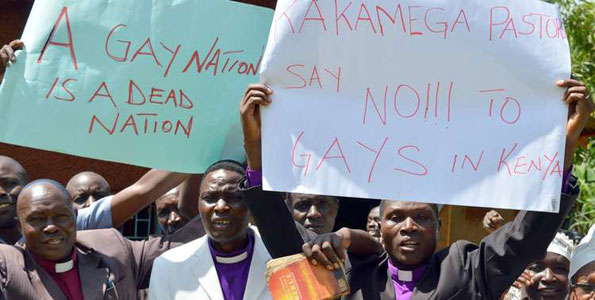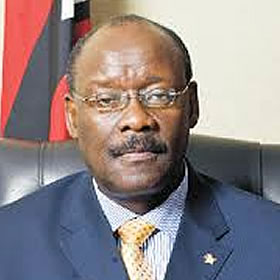LGBTI briefs: Stigma and HIV in Africa, India, Russia
Colin Stewart is a 45-year journalism veteran living in Southern…
News briefs about LGBTI-related health issues in countries with anti-gay laws, excerpted with slight modifications from UNAIDS’s Equal Eyes recap of the world’s LGBTI news.
Involving LGBTI people in the fight against Aids

In South Africa, the Global Forum on MSM & HIV brought together health workers, government officials, and advocates to discuss HIV needs of men who have sex with men (MSM) in Sub-Saharan Africa.
Representatives came from Angola, Botswana, Cameroon, Ghana, Kenya, Malawi, Mozambique, Nigeria, South Africa, South Sudan, Swaziland and Zimbabwe. In some instances, this is the first time that advocates had sat across the table from government officials of their own country.
Participants were briefed on the latest developments at the Global Fund and Pepfar (the U.S. President’s Emergency Plan for AIDS Relief), which are the two largest funders of anti-HIV programs in Africa. Recently, both organizations have opened up their processes to ensure that the voices of communities of people most affected by HIV, including MSM, are adequately engaged in funding decisions and in HIV programs.

LGBTI stigma gives Aids a boost
Stigma against LGBTI Rwandans hampers the battle against Aids there, the Rwanda Biomedical Centre said, while reporting an increase of HIV prevalence among sex workers and gay men. Rwanda does not have a law against homosexual activity, but anti-LGBTI stigma remains strong.
The East African reported:
Findings also reveal that the reason behind the high spread of HIV among the gay community in the country is the stigma and resentment which is subjected to them by society and their families, which has made them continue practising it discreetly and dangerously.
Many of the homosexuals and other members of the LGBT community who live with HIV do not seek treatment while others do not go for HIV testing because they fear mistreatment from the public and medics, which many have been subjected to.
“There is always discrimination and other forms of mistreatment,” said Enoc Ndahenyuka, a member of the Rwanda Rainbow Rights, an association advocating for gay rights.
“We have had cases of our members who have sought medical treatment, and when the doctor sees that the infection is anal, they put you on the side and call other medics, who begin to ridicule them.
“This has made many shy away from anything related to medication.”
HIV/AIDS prevalence is increasing among female commercial sex workers and the gay community, according to a report by the Rwanda Biomedical Centre. Findings reveal one reason behind high HIV among the Rwandan gay community is stigma and resentment, which has made them continue practising their lifestyle discreetly and dangerously. Many of members of the LGBT community who live with HIV do not seek treatment, while others do not get HIV tested because they fear mistreatment from the public and medics.
The survey also indicates that some MSMs are involved in commercial sex. Some 42.5% reported having ever been paid with money, goods, or services for sex. “It is true, commercial sex among LGBT is high,” said Enoc Ndahenyuka, member of Rwanda Rainbow Rights, an association for gay rights. “It’s because most of them are really vulnerable; some have no jobs, others have been rejected by their families & others have kept their orientation secret so that they don’t get thrown out of home.”
Authorities at Rwanda Correctional Services recently confirmed the existence of homosexuality in prisons, raising concerns that many of those who are HIV-positive go on to spread it when they are released. However, calls to distribute condoms in prisons have been suppressed by state health authorities.
Condomless in Zimbabwe

In Zimbabwe, Health Minister Dr. David Parirenyatwa focused attention on HIV in prisons, where a reported 28 percent of prisoners are HIV-positive. His response to that statistic: “Either prisoners are infected already before they get into prisons” or “homosexuality is rampant” in prisons.
Gays and Lesbians of Zimbabwe (GALZ) disputed that response, as New Zimbabwe reported in the article “GALZ disputes claims homosexuality to blame for rise in prison HIV cases.” GALZ director Chesterfield Samba said “prison culture encourages men to have sex with men” and that it isn’t a homosexual issue. Furthermore, he said, “Not providing condoms to prisoners has serious implications that when prisoners are released and come back into society to wives and girlfriends they may infect healthy partners and spread HIV.”
Playing politics with condom supplies in Russia
In Russia, officials are considering banning foreign brand condoms. Many warn the ban will adversely impact HIV prevention: it will reduce condom access and the quality of Russian brands is questionable. Government advisor Dr. Onischenko claims the ban will “make one more disciplined, more strict, and discriminating in choosing partners, and maybe will do a favor to our society in respect to solving demographic problems.”
Transgender issues
The World Health Organization released a report that finds widespread discrimination significantly impacts HIV rates and poor healthcare for transgender people.
India has more foreign transgender people travelling to the country to seek low-cost, high quality sex reassignment surgery.
Also in India, the Census Bureau acknowledged transgender people for the first time in a survey on deaths and suicides. Though an important ‘first step,’ activists noted that recognition is more needed for the living, as in separate prison cells and hospital wards.
For more information, read the full edition of Equal Eyes.





Reblogged this on Fairy JerBear's Queer World News, Views & More From The City Different – Santa Fe, NM and commented:
LGBTQIA and HIV news from around the world…